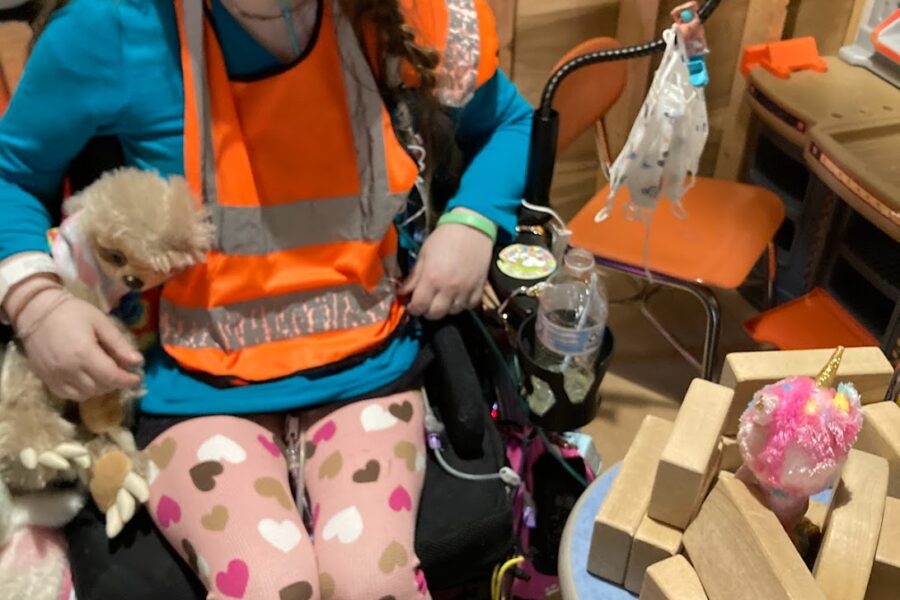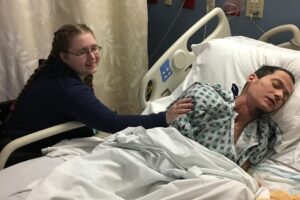Table of Contents
What Does My Developmental Delay Look Like?
Looking like a five-year-old and being on the autism spectrum causes big problems when you are in sixth grade. I think very concretely and have difficulty understanding other people’s emotions. My autism spectrum disorder causes a developmental delay but I have a genius-level IQ.
My interests were less in make-up and boys and more in pretend play with my kitchen set, toy cash register, mini-brand foods, stuffed animals, and other toys. Every day I carried a different stuffed animal around with me wherever I went. If I didn’t have one in my arms, I would panic.
The other kids in my class had more sophisticated senses of humor, but I still thought jokes about poop and pee were funny. At home, I would still have meltdowns and throw major temper tantrums when I got too overwhelmed and didn’t know how to regulate myself.

Being a Genius With a Developmental Delay
Things wouldn’t have been so bad if I just had a developmental delay. The other kids would have understood that and tried to talk slowly to me and make sure I was included in everything. The problem was, that I also had a genius-level IQ. This was obvious, from listening to me answer questions in class. Having this girl that looked like she was five years old and always carried a teddy bear with her wherever she went, but knew Shakespeare by heart made no sense to the other kids, so they decided that I must just be trying to pretend that I was a little kid as a weird kind of game.
Added to the mess of a developmental delay that made no sense to anyone else, there was also the fact that the most popular girl in class, Natasha, got a hold of classified information that I had spent a week and a half on a children’s psychiatric unit in fifth grade.
What made the issue even worse was that I started sixth grade with a tube coming out of my nose to feed me. To top it all off I knew all the answers to the teacher’s questions and had usurped Natasha’s position as the “smartest kid in class.”

Getting Bullied For Being a Genius With a Developmental Delay
The teasing and bullying was brutal. I finished sixth grade early because the tormenting got to be too intense for me to handle.
Despite a developmental delay when it came to my body’s physical, emotional, psychological, and social development, I was way ahead academically. The school could have skipped me ahead a grade or two if they were only looking at me from a purely academic standpoint. The only reason they never did skip me ahead was because of the fact that I had a developmental delay and the social issues that would cause.
My advanced academic skills did, however, make them feel comfortable enough to have me graduate sixth grade immediately. It didn’t matter that it was only March. I would go back in the fall for seventh grade where everyone could start with a clean slate after having a chance to mellow out.
Spring was a good season for me. There was no one to bully me about having a developmental delay. It was just me and my stuffed animals and toys to play with, as well as my laptop, to write on.
When the Reglan Stops Working
Then the summer heat started creeping in and with it a flare-up of my gastroparesis.

The same month I stopped sixth grade, they were able to remove my NJ tube because I was doing so well on the Reglan. The Reglan was a little white pill that Dr. Sander, my GI doctor prescribed me to speed up my stomach’s emptying time so that I would be less nauseous, vomit, and dry-heave less, be less bloated, have less belly pain, and prevent me from feeling full after only two bites.
The Reglan had stopped working that summer between sixth and seventh grade.
Understanding The Gastroparesis Diet Even With a Developmental Delay
Dr. Sander saw me once a month. Her dietitian, Liz, saw me after every visit. Together they put me on a gastroparesis diet that was specifically made for me, and only me. Everyone with gastroparesis has different foods they can or can’t handle, but fiber is always a big no-no for everyone with gastroparesis. I I could tolerate pretty much no fiber. There were absolutely no raw fruits or vegetables that I could eat, and most dairy products were problems. I had always been vegetarian.
Soft high-caloric, easily digestible foods were preferable. We were big on liquid nutrition. I tried to drink two 8-ounce Pediasures a day and three 8-ounce cups of Pedialyte a day as well. I was supposed to eat 6 to 7 times a day instead of just three big meals.

What is a Meal When You Have Gastroparesis?
We would sit down to eat as a family and my mom would cook a meal for everyone except for me. After my mom filled up everyone elses’ plates with food she would put two tablespoons of mashed potatoes on a small little plate, then hand me a big tumbler filled with an 8-ounce cup of Vanilla Pediasure on lots of ice.
A few hours later, I would be playing in my room with my teddy bears. This was something I enjoyed immensely at age twelve because I had a developmental delay. My mom would interrupt briefly with a tiny bowl with two tablespoons of noodles with butter and an eight-ounce cup of Pedialyte.

Bullying Doesn’t Cure Gastroparesis or a Developmental Delay
Those two meals were kind of my mainstays that I would alternate in and out as my dinners that I ate six to seven times a day. Despite the carefully engineered gastroparesis diet, I had started bloating up so badly after consuming so little that I looked something like a pregnant five-year-old.
Then the nausea returned and I couldn’t hold down any of my “meals”. It felt like déjà vu.
“You have to eat your dinner,” my mom kept telling me, stressing out.
“If you don’t start eating your meals again you’re going to have to go back to the psych unit,” my dad yelled at me.
Their anxiety was so high that they blocked out the fact that I had a real diagnosed medical condition stopping me from eating. They wanted to think it was something I could control. It would be so much more simple if the solution was bullying me enough that I would just give in and eat.

There is No Cure For Gastroparesis
My parents went to my appointments with Dr. Sander and Liz with me. Dr. Sander and Liz only spoke about medication and diet as treatments for gastroparesis. My parents knew that I was getting the medication and following the diet but was still having symptoms. They figured that my problems must be psychological if I was getting the treatments for them and they weren’t working.
What my parents were subconsciously blocking out, were parts of the conversations we’d had with the doctors. When I was first diagnosed, the doctors said,
“Gastroparesis is a chronic incurable illness.”
“There are no curative treatments for it.”
“Some people’s symptoms can be managed on a day-to-day basis with diet and medication, but there is no cure.”
Gastroparesis Does Stop People From Tolerating Nutrition and Hydration
“Many people with gastroparesis aren’t helped by any of the treatments. Many people require either NJ tubes or surgically placed tubes that go through the abdominal wall into the stomach or intestines. Some people can’t even tolerate any nutrition through the gastrointestinal tract and have to have central lines placed for intravenous nutrition known as TPN.”

“There is no disease that prevents you from drinking liquids,” my dad keeps insisting.
“That’s one of the things gastroparesis does,” I told him, “You should look it up.” I might have had a developmental delay, but I knew what I was talking about. My intelligence wasn’t affected at all.
“I don’t need to look it up,” my dad snapped. “My psychiatrist himself told me that there is not a single disease that stops you from consuming liquids.”
“Since when do psychiatrists specialize in the GI tract?” I asked him.
In the midst of this gastroparesis-invoked war at home, I began seventh grade, but I would constantly have to leave the classroom to throw up the Pedialyte and Pediasure that my mom packed for me. I did try to sip on it throughout the day but could never hold it down.
The Last Day of Being Bullied For a Developmental Delay
One day in October I saw the note on David’s desk with my name in it, in Natasha’s writing. As we were leaving for our next class, I made the mistake of reading it.

“So, I guess our little mental patient, Becca, has picked up a new eating disorder. How’s bulimia for a change? Now she’s making herself throw up too. Have you seen how many times she goes to the bathroom? She even smells like vomit…Super gross-out…Ewww!!“
That was the last straw. It all piled up on me in my heart so heavily that it was like my chest was full of a thick tarry sludge. It was just too many problems at once…Natasha thinking I’m bulimic, my parents thinking the gastroparesis was just all in my head. Constant nausea, pain, extreme fatigue, and getting teased because I have a developmental delay. Not knowing if things would ever even get better.
A Slideshow of Memories
As I stood there staring at that note. Right there, right in that very moment, it was like everything that had gone wrong in my life was flashing through my head in a slideshow. The slideshow started with my difficulties standing during prayer services at age eight and the first time I couldn’t eat lunch in third grade. Then I could remember how crushed I felt when I had to quit gymnastics after being on the Level Six competition team. Next, I could see myself lying on the floor of the elevator after I passed out following routine bloodwork.

Memories of All My Medical Trauma
I saw a vision of my dad rushing me to the hospital. A view of myself locked in a padded room flashed before my eyes. All my clothes and possessions had been taken away from me.
I felt the tube being shoved through my nose down into my stomach so that they could force-feed me formula. The formula made me so nauseous and caused so much pain. I saw myself being rushed into emergency surgery after my bowel perforated. There was an image of myself with a PICC line in my arm that had to stay for six weeks after the perforation.
Another flash went off in my head as I recalled being diagnosed with a severe chronic illness with no cure. The next flash was all the bullying through sixth grade. I had another flash of all the arguing at home about my ability to eat and drink.
All these memories came gushing out of me in a meltdown of hysterical tears that refused to be tamed.
Reacting Hysterically Due to a Developmental Delay
I went running for the guidance counselor’s office with a ridiculous hope that no one saw the loud sobbing mess I was on the way there. But they were used to my strange behavior. I always acted differently than the other kids because of my developmental delay.

Unable to Self-Soothe Due to a Developmental Delay
I was in such hysterics for over an hour that the counselor didn’t know what to do with me, especially because I had started tearing out handfuls of my hair since I felt so out of control inside and didn’t know what to do with myself except to be violent and cause pain on the outside to match the pain on the inside.
The counselor ended up calling my mom. I just had too many severe mental and physical health problems for her to feel comfortable dealing with me on her own as a run-of-the-mill middle school counselor.
When my mom was unable to talk me out of the hysterical state I was in she gently put her arm around me.
“Here Becca,” she said. “Let’s leave the school. We’re going to get you out of here.” All I wanted was to get out of that building and all the bullies in there, so I let her soothing touch guide me out of the building and into the car.

Who Pulled the “Distraught Switch”?
I wanted to stop crying and calm down, but it was like someone had pulled the “distraught switch” on me and I just couldn’t turn it off. So, when my mom told me she was bringing me to talk to a counselor at the crisis center I didn’t even argue. I knew I needed help. Someone needed to assist me in finding the off button for the “distraught attack”.
We checked in at the front desk of the crisis center.

The Crisis Center
“Have a seat in the waiting room, one of the crisis clinicians will be with you as soon as possible,” an elderly woman behind the reception desk told us. Her face was all wrinkles but her olive green eyes had a sparkle in them that shined with life and vigor.
I was still crying and shaking when a heavyset woman with ironed straight long brown hair and a colorful striped sweater came out asked what my name was, and then offered me some Kleenex.
“Let’s head down to my office,” she told me. “Do you want mom to come?”
I nodded. My mom was still gently rubbing my back trying to soothe me.
We followed the crisis worker, who introduced herself as Janet, down to an office.
“You seem pretty upset. Can you tell me what some of the problems that brought you here today are?’ she asked me in a calm, evenly modulated tone as soon as we got to the office.
Spilling My Guts to Janet Despite a Developmental Delay
“I have this crappy disease where I throw up every time I try to eat or drink something. It makes my stomach hurt all the time. I want to be able to eat so badly. I’m sick of having trouble with my stomach. I’m on medicine for it and follow the special diet for it, but nothing helps.
I just constantly puke back up anything I put in my mouth. When I was ten and eleven I had a feeding tube and I finally got it taken out in March of sixth grade. I’m terrified of getting another one.
The worst part of all of it is that no one understands what gastroparesis is, and that it’s a medical condition. My parents think it’s all in my head. At school, the other kids think I’m some sort of psycho with an eating disorder.
They write these notes about me. The notes go through all the middle school classrooms and then I find them in the trash. When I walk into a classroom, everyone gets all quiet for a minute, and then all the whispering and giggling starts up again. When I walk by the other kids, I hear words like “mental patient”, “anorexic”, or “bulimic” get whispered.
“Yes, I do see a therapist. I did spend time in a psychiatric unit. But I’m not crazy and I’m certainly not anorexic or bulimic. I’m tired of trying to prove that to people. Everything has been piling up inside me, and now I feel completely overwhelmed. I don’t know what to do, I just can’t handle it anymore.”
All the words sort of just gushed out of my mouth through my tears, but Janet heard me.
The Crisis Interview
“It sounds like you’ve got a lot going on,” she said.
I just nodded.
“Do you feel like hurting yourself?” she asked me.
“I don’t want to hurt myself,” I explained to her. “I just want to go home, curl up in bed, and never leave again.”

Janet spoke with my mom and me for a good 45 minutes, then she told me that she needed to speak to my mom alone.
“I will have you sit in a private waiting room with our peer support worker,” she told me.
Having Doubts About My Mom
I wasn’t sure how I felt about that. My mom and I love each other unconditionally. But even though my mom is among the people I love most in the world, she doesn’t always totally understand me. When it comes to my health care my mom has made some grave mistakes that have caused extreme pain and permanent physical and/or emotional damage. My mom put me in that awful children’s psych unit. The one where they put me on Klonopin and then punished the life out of me when I had an adverse reaction to it.
Meeting the Peer Support Worker in the Waiting Room
However, I really had no choice in the matter.
I was only twelve years old, had a developmental delay, and was in the midst of a psychiatric crisis. The counselor walked me into a different waiting room than the one near the reception desk. This room was smaller with cream-colored walls and lined with softer cushioned chairs. There were no windows but bamboo shades. I noticed that it had spider plants hanging up in the corners. One of the walls of this waiting room had a bulletin board, but there was nothing pinned on it. Instead, all the fliers were taped on with thin pieces of gray duct tape. I knew it was an attempt to prevent suicidal patients from hurting themselves with pushpins.
Janet introduced me to a blonde, bucked-toothed peer support worker. After Janet left the room, the peer support worker and I stood there awkwardly just staring at each other. Then she walked over to the water cooler grabbed one of the cone-shaped cups, filled it, and handed it to me.
Wondering if the Peer Support Worker Had a Developmental Disability
“Here, the water from the cooler is always nice and cold,” she told me.

I took the water but didn’t know what to do with it. It had been a nice gesture on her part to offer me the cup of water. How could I tell her that I couldn’t drink it without hurting her feelings or going into a full-blown lecture on gastroparesis? My body began to shake. I started crying again. Why was my life so difficult?
The peer support worker watched me struggle to stop crying as I held the water and my bear Softia.
“Is there anything I can do to make this experience easier for you?” the peer support worker asked, sounding like she was reading from a script.
“No, I don’t think so,” I whispered, trying to go back to my Tetris game.
“I’ve been in crisis myself before too,” she told me. “I used to be in and out of psychiatric units and crisis centers all the time, but then I started using mindfulness practices, DBT, and support groups, and I became a peer support worker to help other people going through what I went through,” she told me.
I wondered if she had a developmental delay too. There was something off about her. Maybe the mindfulness practices, DBT, and support groups had not worked as well as she thought they had.
Having PTSD With My Developmental Delay
Finally, after what seemed like moments frozen in eternity, my mom and the counselor came back for me and brought me back to the meeting room with them.

“We think you’re struggling with a lot of Post-Traumatic Stress Disorder symptoms or PTSD after what happened to you at the psychiatric hospital. Your mom filled me in on your awful reaction to the Klonopin and how abusively the hospital treated you while you were going through it. No child should be left in restraints for two hours that is abuse, not psychiatric care. What you went through was traumatic.” Janet began.
Flashbacks to the Restraints on the Psych Unit
As soon as Janet used the word restraints I started to feel like I was back at the hospital and ten years old again. Even though I didn’t want to think about it, I could literally feel one arm strapped above my head, and one arm strapped at my side.
It may have happened two years earlier but at that exact moment, I could feel both legs spreadeagled with straps around my wrists, ankles, and torso. The straps were tightened as far as possible. There was no way possible to squirm free.
A nurse or aide sat there saying, “You will stay there, just like that, until you learn to behave”.
Two years earlier the wire of energy had made me thrash so hard that my face got slippery with snot, tears, and panic. In the present moment, I put my hands to my face because it felt like it was covered in snot and tears then too. I could still hear the staff that would sit next to me when I was in restraints two years ago. She was yelling at me to “cut the crap” when I felt like I couldn’t breathe because the panic was so intense.
My breathing quickened. As much as I didn’t want to think about any of those memories, it was like it was happening to me all over again.

Four Count Breaths
“Can you take a deep breath with me?” Suggested Janet.
I nodded.
“Take a slow deep breath in through your nose with me while I count to four, then hold that breath while I count to four, and then let it out while I count to four,” Janet instructed
Together we took five ‘four-count breaths.’
“A little better?’ she asked me.
I nodded.
What is a Partial Hospital?
“The plan is to have you go to the Partial Hospitalization Program for Children. I already put the referral in.” Janet told me,
“What in the world is a Partial Hospital?” I asked her, getting really nervous about the word hospital in there.
“A Partial Hospital is a program you go to during the same hours you would go to school. The Partial Hospital I’m referring you to goes from 8:30 AM to 3:00 PM for two to six weeks. They have the same therapy groups, activity groups, a psychiatrist you meet with every day, and school classes that a regular hospital has. This way we can give you a little extra help without retraumatizing you by putting you in another inpatient unit that would flare up your PTSD, Best of all, at a Partial Hospital program, there is no bullying tolerated.”
An Answer to My Prayers
I felt an immense weight get lifted off my tiny body. There had been so much stress piling up on me due to this PTSD thing that it had almost crushed me. The idea of a Partial Hospital appealed to me. Now I could learn how to deal with all my stress. The psychiatrist could look at my meds and decide if they needed adjusting. A nurse there could explain gastroparesis to my parents. Best of all, I could get away from all the bullying.
Before we left the crisis center, I thanked Janet.
“I want to learn how to straighten my hair like yours,” I told her since I had been eyeing it the whole time. Then I gave my mom a big hug. Part of me felt guilty that I hadn’t trusted her. Once again, I felt relief wash through me that I had her as a safety net.

Discover more from chronicallyalive.org
Subscribe to get the latest posts sent to your email.





